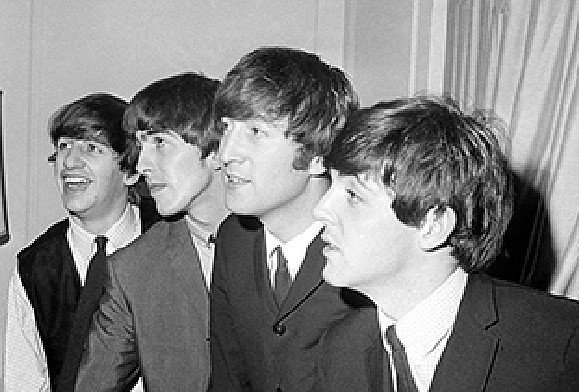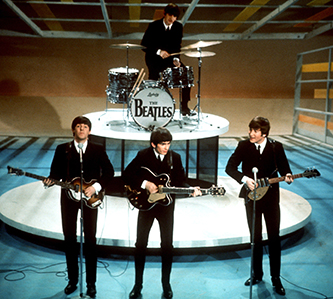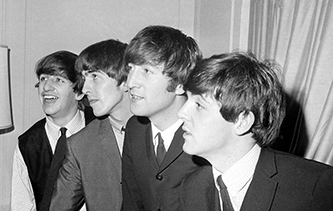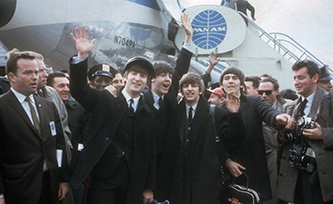FAST FACTWith 23 songs on Rolling Stone's Top 500 Greatest Songs of All Time, The Beatles are the most-represented musical act. They are followed by The Rolling Stones (14); Bob Dylan (13); Elvis Presley (11); U2 (8); The Beach Boys, The Jimi Hendrix Experience (7); Led Zeppelin, Prince, Sly & The Family Stone, James Brown, Chuck Berry (6).
LOCALS SAY ..."As a matter of fact, we played a little club over in England [in 1963] and Paul McCartney came in to see us. The next time I saw them was on the Sullivan show. I remember thinking 'I wonder if those guys will be a success,' but they did all right. ... I always loved their music. They were singing black people's music like the Isley Brothers, and they were so different and the harmonies were just beautiful. Just beautiful. ... To this day it makes my heart feel good that Paul McCartney says that 'People Get Ready' [by The Impressions] is one of his favorite songs."- Fred Cash, 73, Chattanooga native and Rock and Roll Hall of Fame inductee with The Impressions"We always had gospel music and singers around the house. When they [The Happy Goodmans] started out, they didn't have any money and they would come around to eat. Momma used to open her closet for Vestal all the time. ... I loved The Beatles, but I was weird. I liked Conway Twitty and The Beatles at the same time. Oh, my parents totally disapproved, but I think they finally figured out that they couldn't fight it. They disapproved of Elvis more than The Beatles though, because he couldn't stand still. There was too much movement going on. ... We were allowed to watch [The Beatles] on the Sullivan show. I think that might have helped to ease Momma into them."- Jennifer Harris, niece of Cat Freeman of The Statesmen and Vestal Goodman of The Happy Goodmans"I started Black Jacket Symphony in 2009 because it was the 40th anniversary of 'Abbey Road.' It was still being talked about, like a Mozart piece, so I thought it should be treated like one."- J. Willoughby, 54, founder Black Jacket Symphony, which presents classic albums live in their entirety."I saw them not only once, but twice. The first time was in Atlanta Stadium in 1965 on Aug. 18. The second time was in Memphis a year later on Aug. 19. Their last concert was on Aug. 29 in San Francisco, so I saw one of their last 10 shows ever. In Atlanta, I remember being outside beforehand and their police motorcade drove by. I was 13 and in love with Paul McCartney and he was waving to everyone. They did about a 30-minute set. They had opening acts, but what I remember was the first thing was a fashion show from Rich's. Can you imagine? They'd say, 'This one [outfit] is one of George's favorites' and things like that."- Jan Belk, marketing director, Chattanooga Theatre Centre"They've influenced my original music, and I play some covers of their songs. I've listened to them since I was about 5 years old and my parents would play their music. I think it's because of how relevant their songs are. Their relevancy makes them timeless because they wrote about love, and things that were going on in the world at that time, but they are things that are still going on today."- Ryan Oyer, 30, local musician
FIRST PRESS CONFERENCEPartial Transcript from Beatles Press Conference at Kennedy International Airport on Feb. 7, 1964. For full transcript, visit www.beatlesinterviews.org/db1964.0207.beatles.htmlQ. "Are you a little embarrassed by the lunacy you cause?"• John Lennon: "No, it's great."• Paul McCartney: "No."• Ringo Starr: "Marvelous."• George Harrison: (giggling) "We love it."• JL: "We like lunatics."Q. "You're in favor of lunacy?"• Beatles: "Yeah."• JL: "It's healthy."Q. "Are those English accents?"• GH: "It's not English. It's Liverpudlian, you see."• PM: "The Liverpool accent -- so, the way you say some of the words. You know, you say GRASS instead of GRAHHSS, and that sounds a bit American. So there ya go."Q. "Liverpool is the ..."• RS: "It's the capital of Ireland."• PM: "Anyway, we wrote half of your folk songs in Liverpool."• RS: "Yeah, don't forget!"Q. "A psychiatrist recently says you're nothing but a bunch of British Elvis Presleys."• JL: "He must be blind."• RS: (Shaking like Elvis) "It's not true!! It's not true!!"Q. "Would you please sing something?"• Beatles: "NO!"• RS: "Sorry."• Emcee: "Next question."Q. "There's some doubt that you CAN sing."• JL: "No, we need money first."Q. "How much money do you expect to take out of this country?"• JL: "About half a crown."• RS: "$10."Q. "Does all that hair help you sing?"• PM: "What?"Q. "Does all that hair help you sing?"• JL: "Definitely. Yeah."Q. "You feel like Sampson? If you lost your hair, you'd lose what you have? 'It'?"• JL: "Don't know. I don't know."• PM: "Don't know."• Emcee: "There's a question here."Q. "How many of you are bald, that you have to wear those wigs?"• RS: "All of us."• PM: "I'm bald."Q. "You're bald?"• JL: "Oh, we're all bald, yeah."• PM: "Don't tell anyone, please."• JL: "And deaf and dumb, too."Q. "Aren't you afraid of what the American Barbers Association is going to think of you?"• RS: "Well, we run quicker than the English ones, we'll have a go here, you know."Q. "Listen, I got a question here. Are you going to get a haircut at all while you're here?"• Beatles: "NO!"• RS: "Nope."• PM: "No, thanks."• GH: "I had one yesterday."• RS: "And that's no lie, it's the truth."• PM: "It's the truth."Q. "You know, I think he missed."• JL: "Nope."• GH: "No, he didn't. No."• RS: "You should have seen him the day before."
When it comes to having an impact on the direction of America, the two most significant landings in its history would likely be the pilgrims at Plymouth Rock in 1620 and The Beatles at Kennedy International Airport on Feb. 7, 1964.
While there is little historical documentation detailing the first, the second was carried live on television and was witnessed by nearly 5,000 screaming fans who crowded the airport terminal and viewing area, 200 reporters and about 100 New York City police officers.
Fifty years ago this week, John Lennon, Paul McCartney, George Harrison and Ringo Starr made their first trip from England to America and changed everything -- from how men dressed and wore their hair to how rock stars were looked upon. Perhaps more importantly, the band's U.S. visit, coming only a few months after the assassination of President John F. Kennedy, brought a sense of lightness and joy to the States while providing a voice and a direction for young people around the world that previously did not exist.
Their performance on "The Ed Sullivan Show" on Feb. 9 even changed the way TV felt about presenting rock 'n' roll. About 73 million people tuned in to that first Sullivan appearance, more than 40 percent of the entire country. Afterwards, rock bands started showing up on other variety shows, networks came up with music-oriented primetime shows like "Shindig" and "Hullabaloo," and the Emmy-winning TV comedy "The Monkees" was created based on the Fab Four.
"That's the thing about The Beatles," says former Entertainment Weekly editor Cable Neuhaus. "Over time, and it happened pretty quickly, they began to change American's ideas about what was fashionable in terms of attire and the way you would groom yourself. And they redefined what it meant to be a rock star.
"They also redefined what it means to be charitable. They were involved in charitable causes, and they were the first band to be a front for a variety of social causes. They changed celebrity photography for sure. They just changed so many things."
For the 50th anniversary of the Beatles' arrival in the U.S., Neuhaus was asked to write the introduction for a special section put together by the Saturday Evening Post that includes rare photographs and stories from the time. The anniversary is being celebrated and remembered with print and magazine special editions, television specials and concerts, including a reenactment on Feb. 11 of the band's first U.S. concert at The Washington Coliseum.
CBS will present "CBS News, 50 Years Later ... The Beatles at The Ed Sullivan Theater: Presented by Motown The Musical," a live, interactive multimedia event at The Ed Sullivan Theater on Feb. 9.
In the Post piece, Neuhaus posits that other than Steve Jobs, "you'd be hard pressed to find an individual or individuals who so changed worldwide culture like The Beatles. Their influence was so great."
Similar to those who remember where they were and what they were doing when they heard that Kennedy was killed, those who saw The Beatles on "Sullivan" have similar memories.
"My dad loved to cook and he was doing an angel food cake in the kitchen and I was in the living room waiting on The Beatles to come on ['The Ed Sullivan Show']," recalls Mike Dougher, 62, manager of Rhythm & Brews music club. "When they were about to come on, I go running in say, 'Dad, Dad, they're coming on!' and, instead of grabbing the side of the pan, he grabbed the center and it comes out and food went flying everywhere and he looked at me and says 'Ah, forget it, we'll clean it up later.' I just remember it not only as a great moment watching The Beatles but also that we'd just destroyed my mom's kitchen and he didn't care because he wanted to watch them, too."
J. Willoughby, 54, founder Black Jacket Symphony, which presents classic albums live in their entirety, including the Beatles' "Sgt. Pepper's Lonely Hearts Club Band," "The White Album" and "Abbey Road," recalls that he was only 4 years old when the Beatles came to America, but his recollection is solid.
"The main thing I remember is the hair," he says. "I went on and on about them for days. When I woke up a week later, my mom had the album 'Meet the Beatles' on my toy box. I woke her up and made her read me the liner notes. It says they had "pudding basin" haircuts. Never have heard the term since. Then I listened for the next four months until 'The Beatles Second Album' came out. It was over then."
The Beatles had arrived that February afternoon a little unsure of how they would be received, but hoping to introduce themselves to a new market for their music. They were scheduled to appear on "The Ed Sullivan Show" three times in the coming weeks. After their Feb. 9 show, their next two appearances drew 71 million and 59 million. The total number of viewers has been since surpassed, but not the percentage of viewers.
"That is everybody, young and old watching," Neuhaus says. "There is nothing these days that can get that kind of share."
Local musician Michael Welch was one of those watching. He was 13 at the time.
"On Feb. 9, 1964, I watched 'The Ed Sullivan Show' and my life changed forever," he said in an previous interview. "Before that, I wore my hair like Elvis. The hair cream, the ducktail, everything. The day after the [Sullivan] show, I washed my hair and looked in the mirror and realized I looked like a Beatle without putting the Brylcreem in. That Monday I went to school looking like a Beatle. Of course, they sent me home."
Upon landing at Kennedy airport 50 years ago, The Beatles entourage heard what they thought was engine noise from the plane. It was actually the screams from the waiting throng, a fact that left the not-easily-rattled Paul McCartney speechless, even though he had been given some clue ahead of time.
"There were millions of kids at the airport, which nobody had expected," McCartney says in "The Beatles: Anthology." "We heard about it in mid-air. There were journalists on the plane, and the pilot had rang ahead and says, 'Tell the boys there's a big crowd waiting for them.' We thought, 'Wow! God, we have really made it.'
American teens, it appeared, already knew who they were because of songs like "Please Please Me" and "I Want to Hold Your Hand," which had just made it to No. 1 on the Billboard chart in the U.S. Numerous British acts had come over before the Beatles but left with little to show for it. Timing is always important, and young Americans were not only ready for a new pop act, they were ready for a change they could call their own.
The assassination of Kennedy about two months earlier was still fresh in everyone's mind. The Cuban Missile Crisis had ramped up the Cold War, and the Vietnam War had escalated in the years prior. The Civil Rights movement was escalating, and young people were becoming more and more distrustful of the older generation and their view of the world.
"The arrival of the Beatles was the first time I felt that the world might belong to me," writes fan Joe Queenan in a new book called "The Beatles Are Here," a collection of thoughts and memories from a wide array of people. Queenan's words echo a common theme throughout the book, and for young people everywhere.
Looking back at archival footage of the Kennedy Airport press conference and hearing some of the questions asked of the four Beatles regarding whether they could actually sing and if they planned to cut their hair would lead one to think the media, however, didn't take the band seriously. While that might be true, Neuhaus says, there was little doubt as to the news value of covering the arrival.
"There was hardly any choice by the time they got to the U.S.," he says. "They had gotten so big, so fast in the U.K. that, by the time they landed at JFK on Feb. 7, there was no responsible newspaper, including the New York Times, that had any choice but to cover it."
After that day, the media and the fans couldn't get enough.
Tommy Jett was a disc jockey at WFLI-AM at the time and remembers The Beatles' dominance of the airwaves after their arrival.
"I used to do a Top 5 at 5 and a Top 8 at 8 every day. Listeners would vote up until almost air time and, when The Beatles hit, they dominated all five spots and did the same thing with the Top 8," he says. "It didn't last for a very long time, but for a brief period of time, they dominated every spot.
"I also remember the big gala performance for the [July 1964] premiere of 'A Hard's Day Night' at the Martin [cinema] downtown. ... It was pandemonium."
Contact Barry Courter at bcourter@timesfreepress.com or 423-757-6354.



